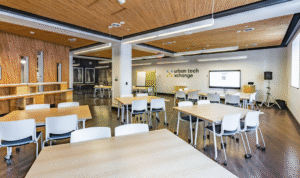
- Kim Kisner
- Community
- 05/02/2023
Neil Hawkins, President of Fred A. and Barbara M. Erb Family Foundation, Reflects on the Network’s Progress

Sustainable Business Network Detroit was formed a year ago out of a study conducted by Erb Family Foundation and is helmed by Terry Barclay, chair, SBN Detroit, and CEO Inforum; Neil Hawkins, president of Fred A. and Barbara M. Erb Family Foundation; and Cindy Goodaker, VP, signature programs and communications, Inforum, along with a distinguished list of organizing members steeped in the sustainability community of Southeast Michigan.
The group’s goal is to create a sustainable business ecosystem by convening a network serving as a hub for idea-sharing, programming, content, mentoring, and more – to accelerate the systemic adoption of sustainable business practices in Southeast Michigan. The primary belief is that business is a positive force for change and can and should be used as a force for good.
For the past twelve months, the network has worked toward three core pillars; advancing and amplifying sustainable business practices in a centralized hub; creating urgency to activate; and articulating a sustainable way forward for the region.
Here, Neil Hawkins shares his viewpoint and insights on the progress the network has made this year and the vision for the future.
What is the impetus behind SBN Detroit? How did the idea arise and how was it developed?
I’ve been involved with sustainability as it relates to businesses for some time and worked for Dow as their chief sustainability officer. Subsequently, Fred and Barbara Erb established the Erb Institute for Sustainable Global Enterprise more than 25 years ago at the University of Michigan. No program like this had existed in the world up until then, and it was very forward-thinking and visionary – the idea that business had a positive role to play in environmental sustainability.

I came to the Erb Family Foundation as the president four years ago and at that time, we commissioned a study done by Sarah McCall – now working as SBN Detroit administrator – of what needed to be done to accelerate progress in sustainability within the region. That research was the impetus behind starting a network that would accelerate sustainability through business collaboration and progress – SBN Detroit.
How do SBN Detroit’s three pillars work together to achieve its mission of mobilizing businesses and organizations to make Southeast Michigan a global leader in sustainability?
Fundamentally the pillars are in place to help break down the barriers – silos.
There are too many silos that exist in the region, and they prevent progress. These are silos between companies and across different-sized companies, and between companies and non-profits etc.
All of those together are a barrier to making faster progress. These three areas of focus – urgency, centralization, and looking forward – are helping to tear down these silos and promote collaboration. The second statement was a fragment as written. I think it’s supposed to say: These three areas of focus – urgency, centralization, and looking forward – are helping to tear down these silos and promote collaboration. (I’m not sure my edits made that clear)
A year in, what impact do you think SBN Detroit has made and is making? What is its greatest success so far?
I think SBN Detroit has helped to completely change the level of dialogue within the region about sustainable business practices. I see it as a ‘before SBN Detroit and after SBN Detroit.’
We are seeing new collaboration and a lot more discussion about how we can work together to move forward, and we are seeing it on a completely different level.
What specifically do you attribute this to?
I think our biggest success in the last twelve months is the March 2022 event we had featuring Dr. Katharine Hayhoe on improving the dialogue about climate change. It was a remarkable event, and the timing was such that it was many people’s first foray into a public space since COVID had begun. The narrative of the event coupled with the interaction among people with like minds and like interests sparked renewed energy toward our collective goals.
I also attribute our success to our steering team. I thank them for laying out a strategy and faithfully bringing people together. If the steering team works well together – and it has – we have a good shot at having continued success.

What is the importance of collaboration when it comes to sustainability in this region?
It is only going to be through collaboration that our region and ecosystem reach their full potential.
SBN Detroit is focused on accelerating collaboration by creating opportunities for dialogue and action. We’ve accomplished this, and I see the fruits of it already. Excellent groundwork has been laid.
What are your thoughts on SBN Detroit as a network?
I think SBN Detroit represents many networks and is not a single network. This is still playing out a bit, and it’s a good thing. As long as we can keep companies and nonprofits and different universities and institutions involved and collaborating and working together that’s a great thing.
What do you see as the primary obstacles to network formation, and how can they be overcome?
The key obstacle is competition – competition between businesses, between businesses and nonprofits, between nonprofits and universities, between universities and other universities, and so on. The key thing we all have to focus on is that this is not a zero-sum game. By collaborating we make the pie bigger for everyone.
There is growth here to be had and a lot of investment to come. We can all share in that growth if we are working together. This will position metro Detroit well.
What do you see as the corporate-level impact of SBN Detroit?
Having come from corporate, what I see through SBN Detroit is a renewed sense of group action and focus on the region, the Great Lakes, and the planet. Pre-COVID some silos existed, and then you throw in a pandemic that forces people to not even go into their workplace, and it is significantly exacerbated. We have started to create a sense of urgency and group action.

What opportunities does the Inflation Reduction Act offer, and can it help accelerate progress toward SBN Detroit’s mission?
There are two things really at play here … the IRA and the Bipartisan Infrastructure Law. Between them, they offer hundreds of billions of dollars of investment in and for sustainability and resilience projects. These dollars will go to regions that have a bold vision and shovel-ready projects and action plans.
The last thing a region should do is apply for funds before defining what will be done with the funds. It’s critically important to have shovel-ready projects. And Southeast Michigan has them.
Between water infrastructure, electrification, and sustainable mobility, this region needs that investment. All the stakeholders – businesses, government, nonprofits etc – need to be singing from the same song sheet to give us a better chance of getting those dollars here.
SBN Detroit is helping foster collaboration to that end.
What do you hope SBN Detroit will accomplish in year two and where should it be a year from now?
Accelerating what we are doing. I don’t want us to get into other tangential areas. I want to remain focused and continue to bring together dialogue. I want to broaden and then deepen the collaboration in the region. If we see more evidence of that after this coming year, we can feel that we are helping to contribute to success.
Be sure to subscribe to our newsletter for regular updates on sustainable business practices in and around Detroit.
Kim Kisner
- All
- Business
- Community
- Education
- Events

Eastern Market Partnership, in collaboration with the City of Detroit’s Office of Sustainability Urban Agriculture Division, has announced $240,000 in grant funding to support Detroit-based farmers and farmer collectives. The grants will advance food access, climate education, sustainable land use, and economic opportunity, with priority given to Black- and Indigenous-led farms, youth-led initiatives, and projects rooted in historically disinvested neighborhoods. The recipients – ranging from cooperatives and community...

Citizen Robotics is a Detroit-based nonprofit that advances the use of robotics and digital manufacturing in residential construction, focusing on improving productivity, sustainability, and long-term affordability. Best known for its early work in 3D-printed housing, it explores how alternative construction methods and new financial models can reduce material waste, lower lifetime operating costs, and enhance the resilience of homes. SBN Detroit interviewed Tom Woodman, founder and president of...

Detroit-based OneSix Energy is a clean-energy technology company focused on advancing a lower-carbon approach to hydrogen production. Headquartered at Newlab in Detroit, the startup is developing a proprietary methane pyrolysis system designed to produce hydrogen without carbon dioxide emissions, while also generating solid carbon as a co-product. SBN Detroit interviewed with cofounder Stefan Sysko about the company’s origins, its approach to hydrogen production, and why Detroit is positioned...







